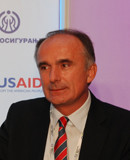You are currently here:
Regional Summit Of Governors Bankers And Businessmen
08.11.2013.
9:00
Hotel Hyatt, Belgrade

Lower credit activity poses greatest problem
Central bank governors from Southeastern Europe agreed at a meeting in Belgrade on Friday that the greatest problems of the banking sectors in the region were the drop in credit activity and the high level of problematic loans.
Governer of the central bank of Bosnia-Herzegovina Kemal Kozaric said at the international summit of governors, bankers and businessmen of the region that all the countries of Southeastern Europe were facing slow credit growth.
Most banking groups find the region not that important, even when their subsidiaries there are significant for the local system, Kozaric said.
The greatest problem in the economy is high unemployment, and one of the main risks is the possibility of the crisis spilling over from the countries where foreign banks are based, he believes.
Head of the central bank of Montenegro Milojica Dakic said loans from abroad had decreased, adding that loan interest rates and low quality loans posed a problem.
He also pointed to the increase in illiquidity in the real sector of the economy, which impacted the banks negatively in the past because of irregular debt payments.
Croatian central bank governor Boris Vujicic stressed that the broadly held opinion among Europe's politicians that economic growth was absent because there was no increase in credit activity had not been confirmed. Credit growth mostly follows the recovery of the economy, he added.
Head of the Albanian central bank Ardian Fulani thinks banks should be the main carrier of financial influence in the region, because the capital market has yet to be developed, and that it will take some time.
The region is hungry for capital and the banks can do a lot there, he noted, adding that in a situation where internal resources were lacking, outside funds were welcome, and that it was up to the authorities to provide a safe environment for their arrival.
Vice governor of Macedonia's central bank Maja Kadijevska-Vojnovic stated that the countries of the region would remain exposed to withdrawals of funds from European banks, although the negative effects caused by trade relations were decreasing as Europe recovered.
She also pointed to the drop in credit activity of banks, stating that it was mostly the result of the fear of risk in banks and banking groups' strategies, which limited credit growth through demands for consolidation.
Tabakovic: Region faces economic challenges
National Bank of Serbia Governor Jogovanka Tabakovic said on Friday the countries of Southeastern Europe faced a poor economic future, pressures to pay off their foreign debt, worsening bank portfolios caused by problematic loans and challenges in EU integration.
High public debt and need for fiscal consolidation are the chief challenges to overcome in order to avoid pressure on the balance of payments of the countries of Southeastern Europe, Tabakovic said at a summit entitled Financial Systems in the Region.
One of the key things is to avoid additional pressure from foreign exchange markets, because of the heavy dependence on exchange rates due to loans related to foreign currency, she said.
Recession and decreased credit activity have led to a faster increase in problematic loans, but Serbia has created reserves large enough to cover them, she pointed out.
Serbia will adopt by the end of the year a strategy for the implementation of the international standards Basel 3 in the banking sector, which will involve plans, deadlines and the standards' implementation related to capital and liquidity, she remarked.
Tabakovic stated she was pleased the inflation in Serbia was dropping, adding that the bad thing was that it was the result of low demand.
Dugalic: Alarmingly high stake of NPLs in total loans
President of the Association of Serbian Banks (UBS) Veroljub Dugalic stated on Friday that the stake of non-performing loans in total loans in late October reached 24.5 percent and qualified the level as alarming.
During the regional summit of governors, bankers and businessmen in Belgrade, Dugalic said that the stake totalled 16 percent at the end of 2012, which means that the increase in this year exceeds 8 percent and the main reason for the problem lies in the poor state of the economy and the real sector.
Without solving the problem, we can hardly expect the situation to improve, he said and added that it is important for general characteristics of the business sector to improve.
Dugalic noted that this is why foreign investments are very important, especially in the agriculture and car industry, so as to make it possible for those taking on debt to meet their obligations.
 registration
registration
Central bank governors from Southeastern Europe agreed at a meeting in Belgrade on Friday that the greatest problems of the banking sectors in the region were the drop in credit activity and the high level of problematic loans.
Governer of the central bank of Bosnia-Herzegovina Kemal Kozaric said at the international summit of governors, bankers and businessmen of the region that all the countries of Southeastern Europe were facing slow credit growth.
Most banking groups find the region not that important, even when their subsidiaries there are significant for the local system, Kozaric said.
The greatest problem in the economy is high unemployment, and one of the main risks is the possibility of the crisis spilling over from the countries where foreign banks are based, he believes.
Head of the central bank of Montenegro Milojica Dakic said loans from abroad had decreased, adding that loan interest rates and low quality loans posed a problem.
He also pointed to the increase in illiquidity in the real sector of the economy, which impacted the banks negatively in the past because of irregular debt payments.
Croatian central bank governor Boris Vujicic stressed that the broadly held opinion among Europe's politicians that economic growth was absent because there was no increase in credit activity had not been confirmed. Credit growth mostly follows the recovery of the economy, he added.
Head of the Albanian central bank Ardian Fulani thinks banks should be the main carrier of financial influence in the region, because the capital market has yet to be developed, and that it will take some time.
The region is hungry for capital and the banks can do a lot there, he noted, adding that in a situation where internal resources were lacking, outside funds were welcome, and that it was up to the authorities to provide a safe environment for their arrival.
Vice governor of Macedonia's central bank Maja Kadijevska-Vojnovic stated that the countries of the region would remain exposed to withdrawals of funds from European banks, although the negative effects caused by trade relations were decreasing as Europe recovered.
She also pointed to the drop in credit activity of banks, stating that it was mostly the result of the fear of risk in banks and banking groups' strategies, which limited credit growth through demands for consolidation.
Tabakovic: Region faces economic challenges
National Bank of Serbia Governor Jogovanka Tabakovic said on Friday the countries of Southeastern Europe faced a poor economic future, pressures to pay off their foreign debt, worsening bank portfolios caused by problematic loans and challenges in EU integration.
High public debt and need for fiscal consolidation are the chief challenges to overcome in order to avoid pressure on the balance of payments of the countries of Southeastern Europe, Tabakovic said at a summit entitled Financial Systems in the Region.
One of the key things is to avoid additional pressure from foreign exchange markets, because of the heavy dependence on exchange rates due to loans related to foreign currency, she said.
Recession and decreased credit activity have led to a faster increase in problematic loans, but Serbia has created reserves large enough to cover them, she pointed out.
Serbia will adopt by the end of the year a strategy for the implementation of the international standards Basel 3 in the banking sector, which will involve plans, deadlines and the standards' implementation related to capital and liquidity, she remarked.
Tabakovic stated she was pleased the inflation in Serbia was dropping, adding that the bad thing was that it was the result of low demand.
Dugalic: Alarmingly high stake of NPLs in total loans
President of the Association of Serbian Banks (UBS) Veroljub Dugalic stated on Friday that the stake of non-performing loans in total loans in late October reached 24.5 percent and qualified the level as alarming.
During the regional summit of governors, bankers and businessmen in Belgrade, Dugalic said that the stake totalled 16 percent at the end of 2012, which means that the increase in this year exceeds 8 percent and the main reason for the problem lies in the poor state of the economy and the real sector.
Without solving the problem, we can hardly expect the situation to improve, he said and added that it is important for general characteristics of the business sector to improve.
Dugalic noted that this is why foreign investments are very important, especially in the agriculture and car industry, so as to make it possible for those taking on debt to meet their obligations.
Governer of the central bank of Bosnia-Herzegovina Kemal Kozaric said at the international summit of governors, bankers and businessmen of the region that all the countries of Southeastern Europe were facing slow credit growth.
Most banking groups find the region not that important, even when their subsidiaries there are significant for the local system, Kozaric said.
The greatest problem in the economy is high unemployment, and one of the main risks is the possibility of the crisis spilling over from the countries where foreign banks are based, he believes.
Head of the central bank of Montenegro Milojica Dakic said loans from abroad had decreased, adding that loan interest rates and low quality loans posed a problem.
He also pointed to the increase in illiquidity in the real sector of the economy, which impacted the banks negatively in the past because of irregular debt payments.
Croatian central bank governor Boris Vujicic stressed that the broadly held opinion among Europe's politicians that economic growth was absent because there was no increase in credit activity had not been confirmed. Credit growth mostly follows the recovery of the economy, he added.
Head of the Albanian central bank Ardian Fulani thinks banks should be the main carrier of financial influence in the region, because the capital market has yet to be developed, and that it will take some time.
The region is hungry for capital and the banks can do a lot there, he noted, adding that in a situation where internal resources were lacking, outside funds were welcome, and that it was up to the authorities to provide a safe environment for their arrival.
Vice governor of Macedonia's central bank Maja Kadijevska-Vojnovic stated that the countries of the region would remain exposed to withdrawals of funds from European banks, although the negative effects caused by trade relations were decreasing as Europe recovered.
She also pointed to the drop in credit activity of banks, stating that it was mostly the result of the fear of risk in banks and banking groups' strategies, which limited credit growth through demands for consolidation.
Tabakovic: Region faces economic challenges
National Bank of Serbia Governor Jogovanka Tabakovic said on Friday the countries of Southeastern Europe faced a poor economic future, pressures to pay off their foreign debt, worsening bank portfolios caused by problematic loans and challenges in EU integration.
High public debt and need for fiscal consolidation are the chief challenges to overcome in order to avoid pressure on the balance of payments of the countries of Southeastern Europe, Tabakovic said at a summit entitled Financial Systems in the Region.
One of the key things is to avoid additional pressure from foreign exchange markets, because of the heavy dependence on exchange rates due to loans related to foreign currency, she said.
Recession and decreased credit activity have led to a faster increase in problematic loans, but Serbia has created reserves large enough to cover them, she pointed out.
Serbia will adopt by the end of the year a strategy for the implementation of the international standards Basel 3 in the banking sector, which will involve plans, deadlines and the standards' implementation related to capital and liquidity, she remarked.
Tabakovic stated she was pleased the inflation in Serbia was dropping, adding that the bad thing was that it was the result of low demand.
Dugalic: Alarmingly high stake of NPLs in total loans
President of the Association of Serbian Banks (UBS) Veroljub Dugalic stated on Friday that the stake of non-performing loans in total loans in late October reached 24.5 percent and qualified the level as alarming.
During the regional summit of governors, bankers and businessmen in Belgrade, Dugalic said that the stake totalled 16 percent at the end of 2012, which means that the increase in this year exceeds 8 percent and the main reason for the problem lies in the poor state of the economy and the real sector.
Without solving the problem, we can hardly expect the situation to improve, he said and added that it is important for general characteristics of the business sector to improve.
Dugalic noted that this is why foreign investments are very important, especially in the agriculture and car industry, so as to make it possible for those taking on debt to meet their obligations.
-

Biljana Jovanović
Director, fashion line Luna
-

Caroline Tsilikounas
CEO, Agroinvest
-

Zlatko Milikić
Assistant Minister, Ministry of Finance of the Republic of Serbia
-

Đorđe Jevtić
Director of department for supervision, National Bank of Serbia
-

Jennifer Chien
USAID Expert
-

Slavko Carić
President of the Executive Board at Erste Bank
-

Predrag Radlovački
Vice President, Head of Region, CITI Bank
-

Marko Ćulibrk
General Manager, Dunav Insurance Company
-

Veroljub Dugalić
President of the Serbian Bank Association
-

Maja Kadievska Vojnovik
Vice - Governor of National Bank of Macedonia
-

Ardian Fullani
Governor of the Bank of Albania
-

Boris Vujčić
Governor of Croatian National Bank
-

Kemal Kozarić
Governor of the Central Bank of Bosnia and Herzegovina
-

Milojica Dakić
Governor of the Central Bank of Montenegro
-

dr Jorgovanka Tabaković
Governor of the National Bank of Serbia
- Prezentacija Jennifer Chien - 273 KB
- Prezentacija Boris Vujčić - 678 KB
- Prezentacija BIG - 9669 KB
- Prezentacija Caroline Tsilikounas - 4127 KB
- Prezentacija Kemal Kozarić - 1777 KB
- Prezentacija Jorgovanka Tabakovic (sr) - 662 KB
- Prezentacija Jorgovanka Tabakovic (en) - 227 KB
- Agenda Regionalni Samit guvernera i bankara (sr) - 469 KB
- Agenda Regional Summit Of Governors Bankers And Businessmen (en) - 447 KB




























